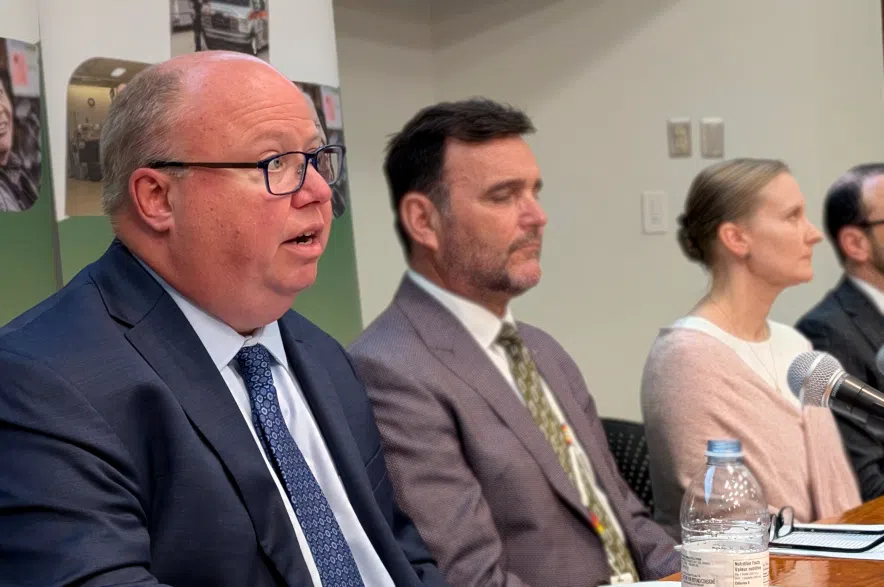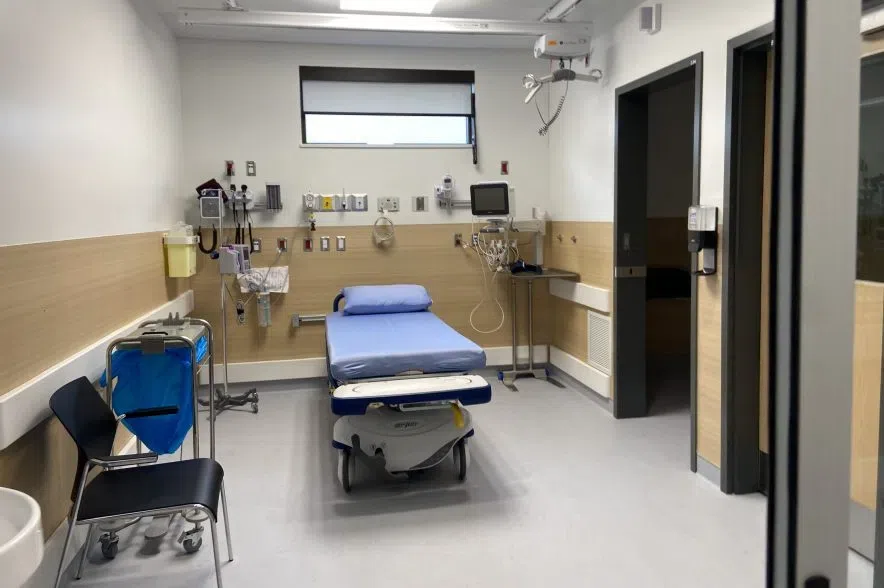A review of the culture within Regina’s hospitals early this year found stories of harassment and bullying, civility between doctors eroding, and decision-making patterns the drive doctors away.
The review was commissioned by the Health Minister in December, after allegations of unprofessionalism, misconduct and racism among doctors working in Regina’s hospitals. In 2023, 10 foreign-trained doctors claimed they faced racism from hospital leaders.
The report also said a lack of access to certain specialized services in Regina was a cause for the review.
Read More:
- Gov’t turning to outside help for review of doctor culture in Regina hospitals
Saskatchewan orders third-party review into reports of doctor misconduct, racism
No timeline for Regina’s Urgent Care Centre to be open for 24 hours
The review was performed by out-of-province doctors Nancy Merrow and Douglas Sinclair, through online and in-person interviews and conversations, and the pair detailed their observations and insights in the 31 page report.
In the review, they heard about a progressive disengagement of doctors in Regina, where they’re becoming indifferent or less involved, and that doctors in Regina have largely held themselves apart from the mission, vision and values of the Sask. Health Authority (SHA) since its inception in 2015.
“Citing the sudden change to a single governance model and perceived inequities between Regina and Saskatoon, physicians convey a sense of distrust of administration and leadership,” read the report.
It also pointed to the Sask. Health Authority, saying executives are distanced from the issues.
“Unfortunately, the volume and seriousness of complaints and concerns has effectively buried the local leaders in crisis management, preventing them from turning their attention to strategic initiatives, reforms and modernization of processes to improve care,” said the report.
The report explained that civility and professional courtesy have eroded between doctors, and pointed out that doctor are independent contractors and have to take responsibility for what they say and do.
“Appropriate consultant response times on call and timely assessment of patients are basic elements of professionalism. Deliberate breaches are unacceptable,” explained the report.
Funding models were talked about in the report – that the model in Regina carries a high risk of aberrant billing practices and can give perverse incentives for how care is provided and how work is divided.
It also talked about some departments in the hospital where the reviewers heard that pursuit of money has overtaken the priority for high-quality and accessible care for patients. And that doctors have been drawn more to Saskatoon, where compensation models and service delivery have developed around the academic mission, research, and trainee experience.
Recruiting and retaining doctors came up many times in the report, in one instance it said that unilateral decisions to change coverage can become a problem in filling gaps and finding new workers.
“When recruits learn that in some groups resources are not equitably distributed to members, they have been known to withdraw applications and move to other jurisdictions,” read the report.
A crisis in medical leadership was also described, saying leaders are discouraged about their ability to make positive changes where needed.
“There is a legacy culture of lack of decisive intervention for issues of concern with physician practice, behaviour, performance and quality. It was repeatedly stated by interviewees that ‘everyone is in charge, so no one is in charge,’” explained the report.
It said in some cases medical leaders have been bullied, threatened, harassed and intimidated into leaving their roles or into being ineffectual. There were also numerous examples of unprofessional conduct brought up to the reviewers.
The recommendations
The review generated 14 recommendations for the health authority, ministry, medical association and the University of Saskatchewan’s College of Medicine, aimed to support doctors and leaders, attract doctors to the province, and ensure an “excellent experience” for medical trainees in Regina.
The recommendations included a review of the health authority’s medical leadership structure, transparency and standardization in the health authority’s selection of physicians and medical leaders, enhancing the understanding of conflict of interest rules for medical leaders and doctors, and enhancing the roles of patient and family advisors in the reform process.
The review further recommended that the health authority apply “various models of physician compensation to optimize access to care, performance and outcomes,” and review the pros and cons of a fee-for-service model.
The health authority
When asked about his reaction to the report, Andrew Will, SHA CEO, called it an opportunity to partner and create an environment that retains doctors, sees them as part of decision-making and part of one team.
“We were aware that there were concerns that there were issues, challenges in the culture amongst physicians in Regina and as part of the health system as well,” said Will.
A draft action plan has been created to respond to and implement the recommendations, according to Will, but the SHA will finalize it with the help of Regina doctors.
“Certainly, in Regina, we’ve seen a significant number of issues that have been raised by physicians, we’ve also seen some challenges in terms of access to certain specialized services for the public,” explained Will.
“By moving forward together we can create an environment that resolves those issues that physicians have raised and also an environment where we can retain and recruit physicians to Regina.”
The Ministry of Health said longer-term implementation will take place over the next six to 12 months.

Andrew Will, SHA CEO, said the report is an opportunity to make changes that retain doctors and make them part of one team. July 7, 2025 (Lisa Schick/980 CJME)
The issues pointed out in the review weren’t a surprise to the health authority, according Will, which is why it had already been working to address them.
It has been reworking its senior physician leadership structure announced last month, to add deputy chief medical officers locally. It launched its anti-racism strategy, with Will said he’s very proud of, and working with the medical association to “finalize practitioner staff bylaws.”
Dr. Jordan Wingate, the health authority’s interim chief medical officer, emphasized the importance of rebuilding the relationship between doctors and the health authority from the ground up.
“It would have been great if it was a glowing report, but it was not, and we have to accept that and we have to own that,” said Wingate.
“But more importantly, we have to decide how we’re going to go forward collaboratively with our physicians, Saskatchewan Medical Association and the SHA and, to me, it’s about what we do from here on out that’s going to identify Saskatchewan as a destination.”
He said he’s confident that if they can move each recommendation forward in a positive way, it will help them recruit and retain – he didn’t say whether he thought the culture problems in the report were part of the reason doctor recruitment and retention in Regina has struggled.
“If we’re successful then we’ll be able bring physicians in and physicians will stay,” said Wingate.
Will said, for him, the biggest measure of success out of all this will be how the doctors are feeling.
“If they’re with us through the development of a plan, I think that’s a positive sign already,” said Will.
–with files from the Canadian Press











